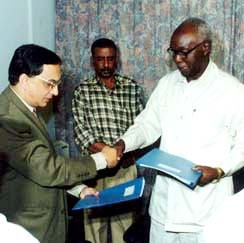News
UNFPA to Help Sudan Reduce Maternal Deaths, Prevent HIV/AIDS
- 02 October 2001
News
The United Nations Population Fund (UNFPA) and Sudan recently signed an agreement to implement a new, five-year population programme in the African country. The Fund intends to contribute about $13.5 million between 2002 and 2006 to help reduce maternal deaths and illnesses as well as prevent HIV/AIDS. This would be achieved by training midwives, rehabilitating midwifery schools and strengthening blood-screening facilities.

The agreement was signed by Sudan’s Minister of International Cooperation, Karam Eldien Abdulmulla, and the UNFPA’s Representative, Zahidul Huque.
Developed within a human rights framework, the Fund’s programme would complement the work of other United Nations agencies in helping to meet basic needs, strengthen emergency preparedness and promote sustainable livelihoods. Activities under the UNFPA’s programme would mostly fall under the areas of reproductive health as well as population and development strategies. The main thrust, though, would be the reduction of maternal mortality through an integrated reproductive health programme that includes the provision of emergency obstetric care, and HIV/AIDS prevention.
Reproductive health work would improve the use of quality such services, particularly for youth, refugees and displaced persons. In addition to helping reduce maternal deaths, the efforts would provide safe and clean delivery care, as well as help prevent infertility and sexually transmitted infections. About 7,000 midwives would be trained and several midwifery schools rehabilitated. Similarly, workers providing emergency obstetric care would get further training in those life-saving skills. Ambulances would be provided to improve the referral system for women with complicated pregnancies or deliveries, particularly in remote areas.
The UNFPA would help improve HIV/AIDS laboratories, the screening of blood for transfusion and train service providers to help fight the scourge.
Having served in Sudan since 1973, the UNFPA has learned lessons that have guided its new programme. For example, it saw that strengthening the referral system for emergency obstetric care was critical to improving the health of mothers and that village midwives were the backbone of the country’s maternal health programme. Further, income-generating activities had enhanced women’s ability to use health services and to keep their children in school.